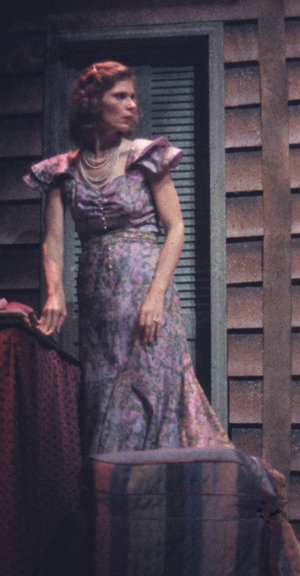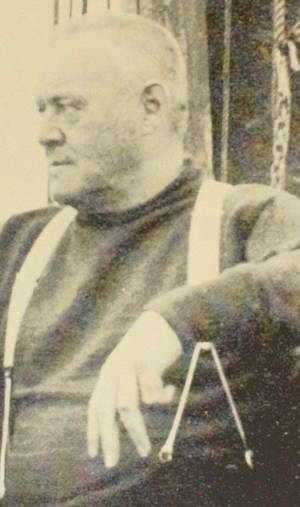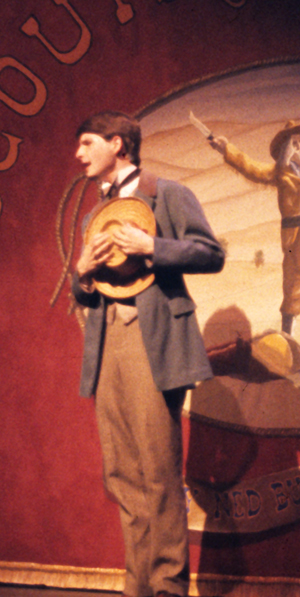AntigoneOctober 2–5, 1985A play by Sophocles
Translated by Robert Fagles
Production Staff
Director: James Fisher
Scene and Light Designer: Brian R. Jones '82
Costume and Graphics Designer: Laura Conners
Stage Manager: Alvin Schuh '88
Asst. Stage Manager/Special Effects: Tryong Nguyen
Assistant to the Director: David Schulz '88
Assistant to the Costumer: Tim Phillips '86
Cast List
Antigone: Lynne Galassini-Jones
Ismene: Mindy Howell
Chorus Leader: Bradley Rickel '87
Chorus: David Schulz '88, Matthew Wilson '86, Brad Baldauf '88
Creon: Nick Roth '88
A Sentry: Ken Siepman '87
Haemon: Michael Shaw '87
Tiresias: Charles Montgomery '86
A Boy: Ben Swan
A Messenger: Mark Hayes '88
Eurydice: Sue Meek Ford
Production Assistance
Make-up Assistant/Wardrobe Supervisor: Mark Hayes '88
Master Electrician: Brett Haffley '88
Lightboard Operators: Jay Baltisberger '89, Tim Meredith
Sound Technicians: Peter Keenan '89, Michael Belica '86
Probably first produced around 441 B.C., Antigone by Sophocles (496–406 B.C.?) is among the most enduring and timeless dramas ever written. The tragedy of Antigone remains quite appealing to modern audiences, especially in times of authoritarian rule. The play is concerned with the clash of two orders, man-made law and divinely ordained law. King Creon symbolizes the need for civic order, the supremacy of reason; Antigone represents the rule of heart over head, of intuition fed by faith in the supervening right of divine ordinances. On still another level the drama reflects the classic conflict between the state and the individual. Sophocles masterfully maintains the tension between the two points of view; yet sympathy remains with Antigone. The balance is never marred, however; Sophocles is not a partisan: Creon speaks in favor of firmness at the helm of government, and Antigone displays violent enthusiasm and overassertive heroism; both are seen dispassionately. Antigone was first produced at Wabash College on the site of Martindale Hall in 1909.
This page is part of an ongoing project to document the history of the theatre productions performed at Wabash College. If you have information not included on this page, please contact the Theater Department or Professor Dwight Watson (watsond@wabash.edu).
|
|
A Streetcar Named DesireNovember 20-23, 1985A play by Tennessee Williams
Production Staff
Director: Dwight E. Watson
Scene and Light Designer: Brian R. Jones '82
Costume Designer: Laura Conners
Stage Manager: Truong Nguyen
Cast List
Eunice Hubbell: Ramona W. Zachary
Stella Kowalski: Lynne Galassini-Jones
Stanley Kowalski: Ken Ogorek '87
Harold Mitchell (Mitch): Andrew G. Roush '88
Blanche DuBois: Jamie Ritchie Watson
A Young Collector: Mark Hayes '88
Steve Hubbell: Marc B. Lorber '88
Pablo: Alvin Schuh '88
Mexican Man: Scott Fendley '88
Nurse: Linda Ostermeier
Doctor: Jay R. McCurdy '89
Production Staff
Propsmaster: Dan Slagel '86
Props Crew: Jim Joven '89, Dan McKinney '89
Master Electrician: Brett Haffley '88
Lightboard Operators: Michael Belica '86, Jay Baltisberger '89
Sound Technicians: Ernie Bowman, Peter Keenan '89
Soundboard Operator: Peter Keenan '89
Graphics: Laura Conners
A Streetcar Named Desire is the story of a beautiful woman betrayed by love. Blanche DuBois, tormented by the memory of her tragic marriage and the scandal she had precipitated in the small Southern town of her birth, flees to New Orleans to find refuge with her sister. But her sensual, crude brother-in-law resents her presence, and in a violent, passionate rage, exposes her past and cuts off her last chance of escape from the squalid misery of her life. A Streetcar Named Desire opened on Broadway in 1947 and ran for 855 performances winning the late Tennessee Williams the Drama Critics Award and his first Pulitzer Prize. Williams has been recognized widely as one of the greatest American dramatists beginning with his autobiographical play The Glass Menagerie in 1945 and through such works as Cat on a Hot Tin Roof, Night of the Iguana, Summer and Smoke, Sweet Bird of Youth, Suddenly Last Summer and many others. Many critics consider A Streetcar Named Desire his finest achievement.
This page is part of an ongoing project to document the history of the theatre productions performed at Wabash College. If you have information not included on this page, please contact the Theater Department or Professor Dwight Watson (watsond@wabash.edu).
|
Poster |
The Long Voyage HomeFebruary 19–22, 1986A collection of short plays by Eugene O'Neill
Production Staff
Director: Ronald Miller
Scene and Light Designer: Brian R. Jones '82
Costume Designer: Norma L. West
Stage Manager: Eric Hiser '86
Assistant Stage Manager: Greg Redding '88
Cast List
Larry Alcorn, Matthew J. Brown '88, Scott A. Eggers '86, Ryan S. Hartzog '88, Mark D. Hayes '88, David Manuel '87, Charles A. Montgomery Jr. '86, Linda Ostermeier, Alvin C. Schuh '88, David Schulz '88, Christopher M. Stephenson '87, Tracy Swaim '86, Ansley Valentine '90, Romona W. Zachary
Production Assistance
Lightboard Operator: Mike Keller '83
Master Electrician: Michael Belica '86
Soundboard Operator: Michael Beason '86
Sound Technicians: Michael Beason '86, Jay Baltisberger '89
Graphics: Laura Conners
Key Grip: James Amidon '87
Grip Crew: Mark Ratekin '88, Tyce Light '87, Fred Hegeman
Before the great American dramatist Eugene O'Neill (1888-1953) began writing his towering full-length plays (including Desire under the Elms, Strange Interlude, Mourning Becomes Electra, The Hairy Ape, Anna Christie, and others) he wrote a series of one-act pieces drawing heavily on his experiences as a seaman. The finest of his many one-act plays are the S.S. Glencairn series which includes: Bound East for Cardiff (1916), a vignette of a dying seaman; The Long Voyage Home (1917), in which the dreams of a sailor are destroyed when he is robbed and shanghaied; In the Zone, a tale of a sailor and his intimate secrets which are exposed when he is accused of being a saboteur; and The Moon of the Caribees (1918) which concerns a drunken spree in a Caribbean port. Film director John Ford made a film based on these plays under the title The Long Voyage Home.
This page is part of an ongoing project to document the history of the theatre productions performed at Wabash College. If you have information not included on this page, please contact the Theater Department or Professor Dwight Watson (watsond@wabash.edu).
|
|
IndiansApril 23–26 and May 16–17, 1986A play by Arthur Kopit
Production Staff
Director: Dwight Watson
Assistant Director: David Schulz '88
Scene and Light Designer: Brian R. Jones '82
Costume Designer: Norma L. West
Asst. Costume Designer: Mark D. Hayes '88
Stage Manager: Ansley Valentine '90
Cast List
Buffalo Bill: Andrew G. Roush '88
Sitting Bull: Michael Worthington '86
Senator Logan: Mark Hatcher '86
Senator Dawes: Chip Lowry
Senator Morgan: Ken Siepman '87
John Grass: David Lawrence Brake '89
Spotted Tail: Jim Amidon '87
Grand Duke Alexis: Matt Brown '88
Interpreter: Mark James
Ned Buntline: Gordon Sheffield '86
Geronim Truong Nguyen
Master Valet: Scott McFadden '89
First Lady: Norma West
Ol' Time President: Scott A. Eggers '86
Wild Bill Hickok: Tim Buell '86
Teskanjavila: Ramona Zachary
Uncas: Mark James
Chief Joseph: Matt Bartlett '86
Jesse James: Jay McCurdy '89
Billy the Kid: Phillip Dewey '89
Ponch Steve Compton '86
Colonel Forsyth: Matt Brown '88
Lieutenant: Mark James
A Reporter: Scott McFadden '89
Little Hawk: Jason Foos
Buffaloes: Matt Bartlett '86, Truong Nguyen, Phillip Dewey '89
Soldiers: Jay McCurdy '89, Steve Compton '86
Indians: Matt Bartlett '86, Truong Nguyen, Phillip Dewey '89, Daniel Degryse '86, Jim Amidon '87
Rough Riders: Jay McCurdy '89, Phillip Dewey '89, Steve Compton '86, Daniel Degryse '86
Production Assistance
Graphics: Laura Conners
Master Electrician: David Weir '88
Lightboard Operator: Alvin Schuh '88
Assistant Preset Operators: Michael Beason '86, Eric Hiser '86
Soundboard Operator: Tom Jakubowski '88
Sound Technicians: Tyce Light '87, Peter Keenan '89
Propsmaster: Michael Belica '86
Props Crew: Pat Flanagan '86, Chris Campbell '89, Bill McClain '89, Mike Keller '88
Fly Crew Chief: Mike Keller '88
Arthur Kopit has described his play Indians as “a combination of Wild West Show, vaudeville, and circus… There are dances; phony horses; things go wrong all the time – mock-murders turn into real murders, there are conversations with the dead. It's a hallucinatory mosaic; a nightmare panorama of Buffalo Bill reliving his life and trying to work out where he went wrong.” The action takes place in the center ring of Buffalo Bill's Wild West Show. The performers include Billy the Kid, Jesse James, Wild Bill Hickok, and assorted politicians and their victims – Geronimo, Sitting Bull, and other Plains Indians. As they re-enact their parts in the conquest of the West, the legend of the Western hero bravely taming a savage land is shown to be a fraudulent mythologizing of greed and stupidity.
This page is part of an ongoing project to document the history of the theatre productions performed at Wabash College. If you have information not included on this page, please contact the Theater Department or Professor Dwight Watson (watsond@wabash.edu). |
|



